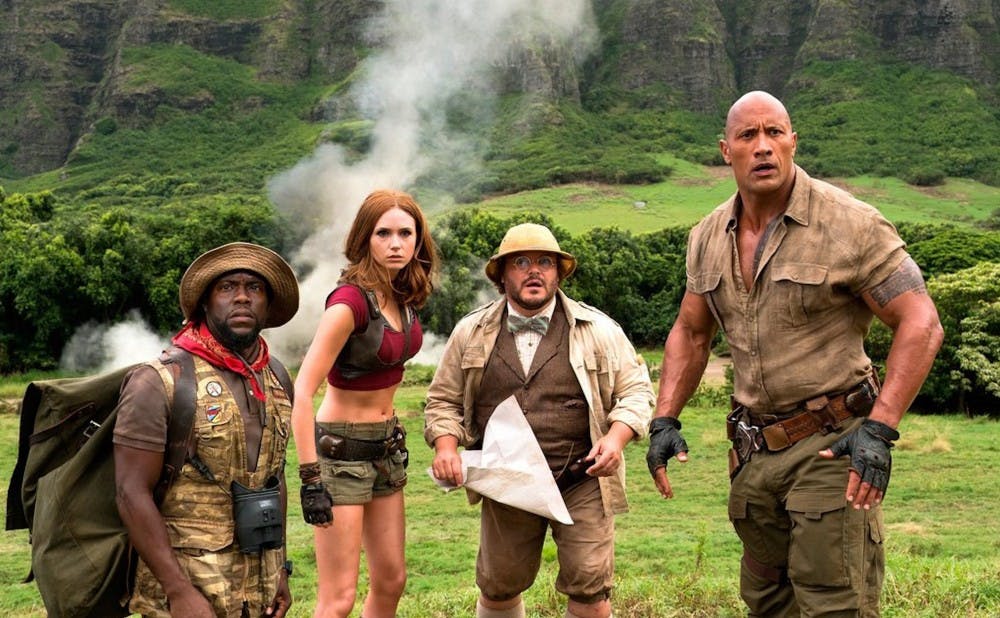“A game for those who seek to find / a way to leave their world behind.”
Reminiscing on my elementary school days, when I was first introduced to the 1995 adaptation of “Jumanji,” I recall the orphaned Judy and Peter Shepherd (Kirsten Dunst and Bradley Pierce) unleashing creatures from the depths of a centuries-old board game into their new home, including a disheveled Robin Williams who is finally released twenty-six years into the future.
Jake Kasdan’s 2017 reboot, “Jumanji: Welcome to the Jungle” is vastly different from the Jumanji I knew as a kid. Boasting a decently large budget and recognizable cast of comics including Jack Black, Kevin Hart, and Dwayne “The Rock” Johnson, the reboot seeks to establish itself as a bold and adventurous crowd-pleaser — but does it revitalize the concept of the original film, or is it merely another nostalgia-baiting blockbuster?
The movie tells a typical tale of four high school teens, each attributed “Breakfast Club”-style archetypes (brain, athlete, basket case, princess), who land themselves in detention and stumble upon a video game entitled “Jumanji” — favored here to the original board game as an appeal to younger audiences. The unsurprising and bland nature of each character’s personality fails to add any depth or intrigue to their development, despite acquiring separate bodies and physical capabilities within the game.
Typical to their archetypes, the “popular” girl Bethany (Madison Iseman) is obsessed with her phone and notes that she is “too pretty” to assist the other characters in detention, the “nerdy” kid Spencer (Alex Wolfe) is awkward and gangly and the athlete Fridge (Ser'Darius Blain) is apathetic about matters that do not involve sports. Although the unlikely quartet become friends in the end, transcending the norms of their suburban high school, the film’s fatal mistake is ultimately reinforcing these traits as “norms” to begin with rather than challenging them.
Once the band of teens is whisked into the jungle cyberworld that is “Jumanji,” they find themselves inhabiting wildly inapposite avatars, supplying easy laughs to audiences via all-too-obvious tropes poking fun at the irony of their new physical characteristics. Popular girl Bethany now inhabits Jack Black’s body, shrieking in horror at becoming an “old fat man.” Spencer is replaced by The Rock’s hulking form, as he ogles at his burgeoning biceps. Fridge becomes Kevin Hart, balking at his dramatic diminution in size and stamina.
Perhaps most problematic of all is social pariah Martha’s (Morgan Turner) transformation into the fierce and sexy Ruby Roundhouse (Karen Gillan), whose strengths are “dance-fighting” and flirting. Clothed in just a crop top and shorts, Ruby Roundhouse embodies the highly sexualized female characters within the action/adventure genre — including Angelina Jolie’s starring role in “Lara Croft: Tomb Raider” — who primarily serve as objects to appease the male gaze. Although Martha notes in passing the highly impractical nature of the outfit (perhaps after backlash during the early stages of production), the film neglects to question the implications of sexualizing female action heroes.
Following in the tradition of the Jumanji, the characters must, of course, complete the game in order to be released. The four team up with Alex (Nick Jonas), who has been stuck in the game since the mid-nineties, a likely homage to Robin Williams’s character in the original film. In between overcoming various levels and dodging familiar creatures from the 1995 film (rhinos, vines, crocodiles) the reboot is littered with unamusing millennial jokes, toilet humor and tasteless, poorly disguised gay ridicule.
Despite clear flaws, the actors must be commended for committing to their roles. Struggling with the disparate identities the game presents to them, each maintains insecurities regarding their real or virtual selves that they must overcome to complete the game. That said, “Jumanji: Welcome to the Jungle” is an entirely predictable film that achieves exactly what audiences would expect of it and nothing more. “Jumanji” isn’t groundbreaking by any means, nor does it seek to be. It is a movie that requires minimal background knowledge and makes for a virtually mindless viewing experience: There is a goal, there are obstacles and the goal is ultimately met.
“Jumanji” had the opportunity to surpass expectations through magnified character development, unconventional storytelling or heightened social commentary, but it is simply not that kind of film. It is a crowd-pleaser, delivering the excitable adventure and calculated laughs that it feels it must yield — and maybe that’s okay. Not every film can consign an innovative, esoteric, thought-provoking cinematic experience, right?
The newest adaptation of “Jumanji” is practically unrecognizable when I think back to the Jumanji of my childhood; that is to be expected, but whether the reboot was successful in its attempt is debatable. You could do much worse than watching “Jumanji: Welcome to the Jungle” this month — see: Michael Gracey’s “The Greatest Showman” — but then again, you could do much better.
Get The Chronicle straight to your inbox
Signup for our weekly newsletter. Cancel at any time.

